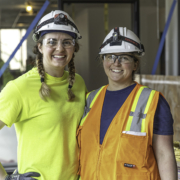Health-related concerns about exposure to common construction products like silica, lead and asbestos are well documented. Employers have the ability to easily identify these materials and establish work practices that reduce risk. Very specific regulations from EPA, HUD and OSHA can be followed to protect workers, occupants and the public from harm.
With coronavirus, our employers and workforce are dealing with a new health hazard in which we do not have the ability to immediately identify known exposure. Measurable and standardized safe work practices have yet to be identified. The volume of frequently changing information from federal, state and local safety and governing agencies is almost overwhelming to keep up with.
To better manage this pandemic situation, safety professionals from nearly 20 Oregon Columbia NECA-IBEW 48 contractors joined forces to network and collectively establish COVID-19 based policies, procedures and best practices to help keep our workforce healthy and maintain project productivity as best as possible. This workgroup also had participation from Los Angeles and Puget Sound NECA Safety Directors to better identify specific requirements to work in outlying areas from Portland.
Key topics the group focused on include:
- Training of workforce – what resources exist from CDC, OSHA and NECA and how to best apply them
- OSHA concerns – application of general duty clause, illness recordability/reportability and employee complaint response plans
- Documentation issues – written exposure control plans, project access pre-screening surveys, use of permit system for work that requires two or more people within six feet, social distancing and sanitation procedures, and notification of known virus exposure in the workplace
- PPE/OPE – sourcing of very limited personal protective equipment and sanitation supplies, clarifying use of covered face masks—mandatory or voluntary, options to minimize fogging of safety glasses caused by face mask use, face shields used as additional barriers for work within six feet of each other, application of misters and sprayers for disinfecting, and sanitating of tools and equipment
- Mental health – strategies to help improve morale and reduce stress, use of safety meetings, and NECA’s Stand Down to promote a positive end result for implementing work practices that will more quickly bring an end to this construction disruption
This group continues to meet weekly using an online platform and will focus on improving our current working conditions to the extent possible. They represent safety leadership not only for their direct employers, but for our industry as a whole.
Barry Moreland
NIETC Safety Director
bmoreland@nietc.org
503.501.5066

